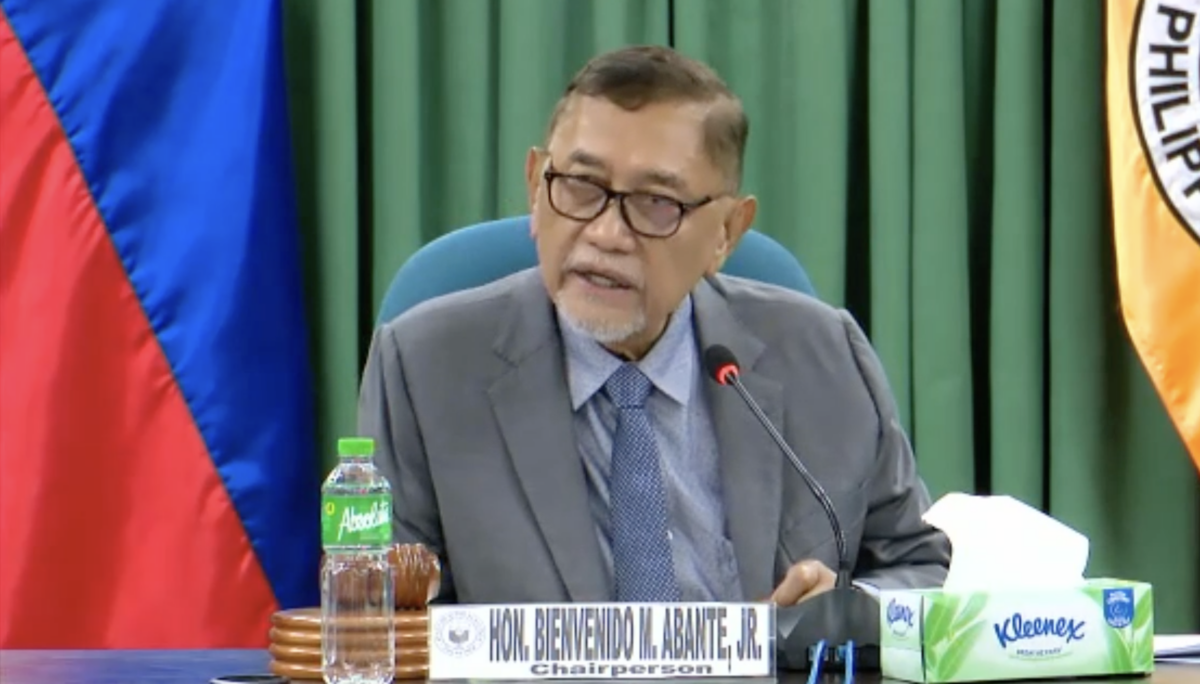Abante says drug war victims’ kin should attend hearings and not give in to fear

Manila Rep. Bienvenido Abante Jr., chair of the House committee on public order and safety —screengrab from House of Representatives YouTube livestream
MANILA, Philippines — It is preposterous for relatives of individuals who died during the past administration’s war against illegal drugs to skip a congressional hearing about alleged abuses just because of fear, according to Manila Rep. Bienvenido Abante Jr.
Abante, during Wednesday’s hearing of the House of Representatives’ committee on public order and safety which he chairs, asked National Union of People’s Lawyers (NUPL) secretary general Kristina Conti why only three drug war victims’ relatives came out to discuss their plight.
READ: War on drugs: The violence, scars, doubts and families it left behind
When Conti said that victims are still afraid to come out due to fear of retaliation, Abante said this is basically the reason why investigators are finding it hard to probe the issue and file cases.
“That’s the reason why the police are having a hard time investigating this. Now again, let me say Atty. Conti, we would like to ask the parents of the victims to come out, they should not fear (attending) this hearing, I think our Philippine National Police is compassionate enough, they are humans who saw the injustice too,” Abante said.
READ: 3 policemen guilty of killing Kian delos Santos — court
Why only three?
“In the last hearing, (former Justice) secretary (Menardo) Guevarra admitted that there were human rights violations. (Retired) General (Oscar) Albayalde too, and the thing is, they’re here today, to be able to find out. That’s the reason why my frustration is, why only three, when we have more? And your reason, that they are afraid to come out. Come on, that’s a preposterous reason, Atty. Conti,” he added.
Conti answered that the psychosocial support given to victims’ relatives takes years—noting that it will be “re-traumatization for them to retell their stories” in a public hearing being watched by the people.
READ: Caloocan cop found guilty for ‘drug war’ deaths of two teens
During the hearing, there were three women who testified to the alleged abuses conducted by the police, in implementing former president Rodrigo Duterte’s drug war. One of them was Christine Pascual, mother of 17-year-old Joshua Pascual Laxamana who was killed in an anti-drug operation in Pangasinan, last August 2018.
Police claimed Laxamana was riding a motorcycle and missed their checkpoint, and eventually fired against officers. However, Pascual said her son does not even know how to ride a bike, and was just coming home after participating in a Defense of the Ancients (DotA) game in Baguio City.
Pascual turned emotional several times when she was speaking about her ordeal, noting that losing her son is still painful even six years after the incident.
Ample protection
Abante meanwhile assured drug war victims’ relatives that ample protection would be given by the committee—reminding Conti to tell the complainants to muster the courage to tell their stories.
“This committee Atty. Conti has promised protection for them, and I am going to lay my life on the line on this. That’s the reason why we are now investigating this, whatever happens. The thing is, what we are after is this: are there human rights violations? Some admitted it, okay. Did something illegal happen with the victims, with what we want to investigate. Are they the only ones brave?” he asked.
“You know please tell them, even Secretary Guevarra said that this is the first time Congress is investigating after so many years. Why? Because even after so many years, that is still injustice. Even after 10 years, that is injustice,” he added.
The House panel is investigating allegations of extrajudicial killings in Duterte’s drug war. While many praised the drug war for addressing the country’s drug menace, it was also criticized for being too bloody, and with innocent civilians—including minors—being dragged into the killing incidents.
Laxamana is not the first minor killed during the drug war. In August 2017—a year before Laxaman died—another 17-year-old in Kian delos Santos was killed despite him not being the original target of the anti-drug operation in Caloocan City. He was shot point-blank even if camera footage showed him pleading for his life.
Two days before Delos Santos was killed, Arnaiz and de Guzman’s bodies were found in different areas—Arnaiz in a funeral in Caloocan City, and de Guzman, in a creek in Nueva Ecija.